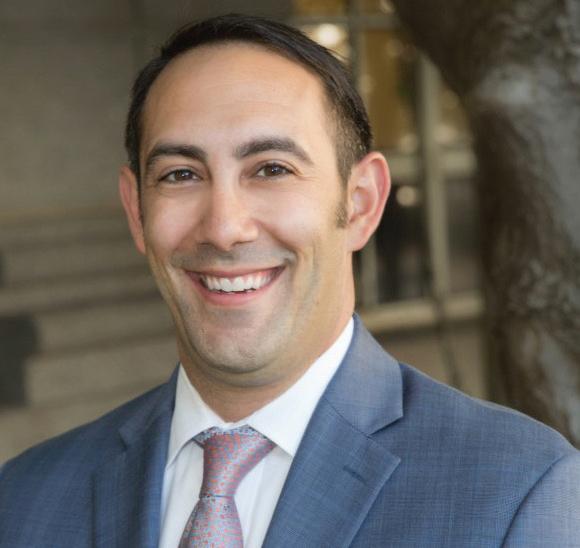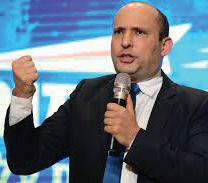
11 minute read
ISRAEL
NEWS FROM OUR JEWISH HOME
Israeli Artist Upcycling Items into Keepsakes
while giving them new life, Israeli dollmaker Nana Warszawski was commissioned during the pandemic to make a collection of figures in memory of a customer’s parents who had both died of COVID-19, within four days of each other, according to The Times of Israel. Warszawski produced 14 dolls for family members made from articles of clothing that had belonged to the client’s parents. “I’m not a therapist, I just make dolls,” Warszawski told The Times of Israel. “But there are some dolls that really enter my but continuing the stories and memories associated with them. When a child, teen or adult connects with the quirky, elfin doll made for them, there’s no better satisfaction, Warszawski said. The dolls start at 300 shekels ($90) for customized work. Customers can also come to Warszawski’s Jerusalem studio and work on the doll with her. life. People tell me their stories and
Nana Warszawski of how can you ever
Project Creatures, her get tired of that?
Jerusalem business And sometimes that upcycles fabric and textiles into dolls and creatures. people come and bring me their fabric and don’t tell me anything at all.” Warszawski sees her work as a way to reuse fabrics and textiles biggest and best art exhibitions open- cording to The Times of Israel. “We want to ing in 2021 around the world, accord- breathe oxygen back into the tourism econing to The Times of Israel. The Tel Aviv omy of Israel, and Israel has the advantage exhibit is a joint collaboration of Stu- as a healthy, vaccinated country,” Farkashdio Kusama in Tokyo and the Gropius Hacohen said at the press conference last Bau in Berlin. month. The plan is to allow vaccinated tourThe exhibit will include works ists and to target visitors specifically from created by Kusama over the last 70 the United Arab Emirates, United States and years, including drawing, painting, the United Kingdom, where there are a large Courtesy of Ota Fine Arts // sculpture, installation, and cinema Yayoi Kusama’s “Infinity Mirrored Room — Love Forever,” part of an exhibit of her work coming and fashion. “Her entire oeuvre is mesmerizingly powerful, impressive to the Tel Aviv Museum of Art. and pleasurable at the same time,” said Suzanne Landau, curator of the exhibition and the museum’s former director. “The presentation of her retrospective at the Tel Aviv Museum of Art is definitely a unique event of historic magnitude.” Kusama is the most tagged artist on social media, and she is widely seen as one of the most popular modJapanese Artist Gets Retrospective ern artists. percentage of vaccinated populations. There at Tel Aviv Museum A large retrospective of Japanese artist Yayoi Kusama, whose work was recently feaIsrael Plans to Reopen to Tourists This Month is some contention over the rush to allow tours back, with the Health Ministry recommending the delay of the relaunch until June because of new COVID variants, particularly tured at the High Museum of Art in Atlanta, Tourism Minister Orit Farkash-Hacohen one from India. Part of the global advertising will be on display at two buildings of the Tel unveiled a four-part plan to reopen Israel to campaign to get tourists to come to Israel will Aviv Museum of Art in November. tourists April 27, including a global advertis- include the slogan: “2020 Holy Moses, 2021
Over 200 pieces of her work will be fea- ing campaign, flight incentives, and the rein- Holy Land.” tured during the exhibition, ranked one of the troduction of large international events, ac-


Flash 90 // An El Al plane at Ben Gurion Airport in Israel.
Today in Israeli History
May 15, 1947 The United Nations establishes its Special Committee on Palestine, which four months later recommends the partition of Mandatory Palestine into Jewish and Arab states.
May 16, 1916 Britain’s Mark Sykes and France’s Charles Georges Picot complete the secret Sykes-Picot Agreement to divide the former Ottoman territories in the Middle East after World War I. Palestine falls under British control.
May 17, 1977 Likud claims an upset victory in the Knesset election, putting Menachem Begin in a position to become prime minister and end three decades of leadership by Mapai (the predecessor of Labor) and its allies on the left.
May 18, 1965 Syria hangs Israeli spy Eli Cohen in a public square in Damascus. Cohen, who had infiltrated the highest levels of Syrian society as businessman Kamel Amin Thaabet, was arrested in January.
May 19, 1966 President Lyndon Johnson’s administration announces the first U.S. sale of warplanes to Israel. The A-4 Skyhawk light bomber enters service in Israel in 1968.
May 20, 1948 The U.N. Security Council makes Count Folke Bernadotte, a Swedish diplomat, the mediator for peace efforts during Israel’s War of Independence. He arranges a truce in June but is assassinated in September.
May 21, 1963 Zalman Shazar, a native of Belarus and former Knesset member for the Mapai party, is elected Israel’s third president, succeeding Yitzhak Ben-Zvi, who died a month earlier during his third term in office.
May 22, 1970
Popular Front for the Liberation of Palestine terrorists attack an Israeli school bus near the Lebanese border, killing eight children and four adults.
May 23, 1969
Hanin Zoabi, a Balad member of the Knesset from 2009 to 2019, is born in Nazareth. She is the first Arab woman to win a Knesset seat as part of a predominantly Arab party.
May 24, 1948 Inexperienced Israeli soldiers attack the Jordanianheld hilltop fortress at Latrun to relieve the siege of Jerusalem. Using outdated tactics without air support, the assault fails, and about 75 Israelis are killed.
May 25, 2010 Jazz artist John Zorn hosts opening night of New York’s first Israeli Jazz Festival at The Stone, his venue. The five-day festival celebrates the many Israelis who have risen to the top of the world jazz scene.
May 26, 1924 Congress passes the 1924 Immigration Act, which restricts immigration based on a nation’s percentage of U.S. residents in the 1890 census. Most Jewish newcomers are blocked, and Palestine becomes a more popular destination. May 27, 1911 Teddy Kollek, Jerusalem’s mayor from 1965 to 1993, is born in a Budapest suburb. Named after Theodor Herzl, he moves to Palestine with his family in 1934 to escape Nazism. May 28, 1999 The Israeli submarine Dakar, which disappeared with 69 sailors in January 1968, is discovered between Crete and Cyprus almost 9,800 feet beneath the surface of the Mediterranean Sea. May 29, 1911 Poet Leah Goldberg is born in Königsberg, Prussia, now Kaliningrad, Russia. She begins writing poetry around age 12 and is a published writer before she moves to Tel Aviv in 1935. May 30, 1972 Three Japanese Red Army terrorists hired by the Popular Front for the Liberation of Palestine kill 26 people at the international airport in Lod. The victims include 17 Christian pilgrims from Puerto Rico. ì

Menachem Begin casts his ballot in the 1977 Knesset election, won by his Likud party.
Photo by Shervin Lainez Anat Cohen was one of the featured performers at the inaugural Israeli Jazz Festival in New York in May 2010. Items are provided by the Center for Israel The shattered school bus is searched after an ambush near the Education (israeled.org), where you can find more
Lebanese border May 22, 1970. details.

ISRAEL TRAVEL
Prime Minister Failed to Form a Government
By Jan Jaben-Eilon



Prime Minister Benjamin Netanyahu had 28 days in which to form a majority coalition government. He failed to do that. Whether or not this is the beginning of the end of the Netanyahu era, however, is still unclear.
Minutes before midnight May 4, Netanyahu Prime Minister Benjamin Netanyahu is the longest-serving leader in Israel’s history. returned the mandate he had received from President Reuven Rivlin. Fewer than 24 hours later, Rivlin handed the mandate to Yair Lapid, the head of the Yesh Atid party, and the second largest in the Knesset after Netanyahu’s Likud party. Lapid will now have 28 days, with a possible two-week extension, to succeed where also failed, leading to the March elections, the results of which ended in another stalemate. Anshel Pfeffer, who writes for the Israeli newspaper Haaretz, said it is “a bit premature” to say that the Netanyahu era is ending. However, if he is replaced as prime The Israel Democracy Institute prepared this chart to illustrate the complex system to creating a government in Israel. Netanyahu failed: Forming a new government.
If Lapid also fails, Israel will head to the polls again, the fifth election since spring 2019. Political pundits state that is what Netanyahu wants. Meanwhile, he remains the head Naftali Bennett said a fifth election would “simply destroy the country.” “The unity government is not a compromise – it is the Yohanan Plesner said 70 percent of Israelis polled believe the country “The government is stronger than just one person,” Dov Wilker said. of a transition gov- objective,” Yair Lapid said. will have a fifth election this year. ernment, as he has over much of the last two years. According to Yohanan Plesner, president of the Israel Democracy Institute, “Our latest data indicates that most Israelis are skeptical about any government being formed, with 70 percent thinking we’re headed to fifth elections in the coming months.” Israelis seem to be basing their predictions on experience. In the second election of 2019, after Netanyahu failed to cobble together a majority of the 120 members of the Knesset to form a government, the mandate was handed over to Blue and White party leader Benny Gantz. Newspapers at that time started heralding the end of the Netanyahu era. Rivlin went so far as to call Netanyahu the “outgoing prime minister.” But Gantz also failed to produce a coalition government and the country went to its third election. That election yielded a so-called unity government led by Netanyahu and Gantz, focused on fighting the pandemic and resulting economic chaos. But that government minister, Pfeffer acknowledged that it would be a “massive event…a pivotal moment,” but it wouldn’t “be the end of Netanyahu by any account. He will not be resigning as leader of Likud. He will be greatly diminished, but he will do everything he possibly can to get back into that office.” It is an office that Netanyahu has filled longer than any other Israeli, serving 15 years as prime minister. Dov Wilker, regional director of the American Jewish Committee in Atlanta, pointed out in an email to the AJT, “Netanyahu’s time as prime minister has, incredibly, spanned both the direct voting of PM (1996-1999) and the more traditional way (being the leader of Likud and being able to form a coalition government). Should a government be formed without Bibi as prime minister,” he said, using Netanyahu’s nickname, “it would mark a shift. But the government is stronger than just one person. It would also demonstrate the vibrancy of the Israeli democracy, which for students and people advocating for Israel, will be an additional item for people to consider.” Indeed, in passing the mandate to Lapid, Rivlin addressed “fellow Israelis,” saying, “We have been caught in a maze – if not a political crisis – for some time now. But we must not allow these difficulties to undermine our faith that we are on the right path and that we can continue to build the sovereignty of the Israeli people here.” In accepting the mandate, Lapid wrote that “after two years of an endless political nightmare, Israeli society is reeling. The unity government is not a compromise – it is the objective.” Putting together his coalition will still be a challenge. According to Israeli press, Lapid will allow Naftali Bennett, chairman of the right-wing Yamina party, to fill the prime minister’s seat for the first two years, then rotate to Lapid – assuming the government lasts that long. Bennett had been seen as the kingmaker of the next government, even negotiating to join a Netanyahu-led government. Enticed by the premiership, Bennett also wanted to avoid another election, which he told The Times of Israel would “simply destroy the country.” He said he was willing to join a “broad emergency government…that will get the wheel out of the mud.” The coalition is expected to include right-wing parties such as Bennett’s Yamina party, Yisrael Beytenu and the New Hope party, center parties such as Blue and White and Yesh Atid, as well as left-wing parties such as Labor and Meretz. It is unclear whether any Israeli Arab parties would help form the new government. Negotiations between the disparate parties about the division of roles in the various ministries in the government had already begun before Lapid received the mandate to form the next government. ì












